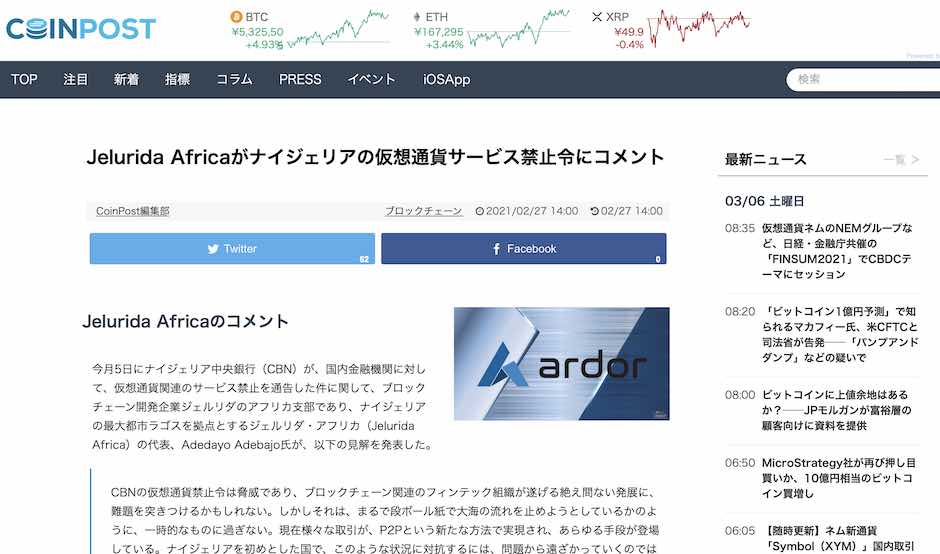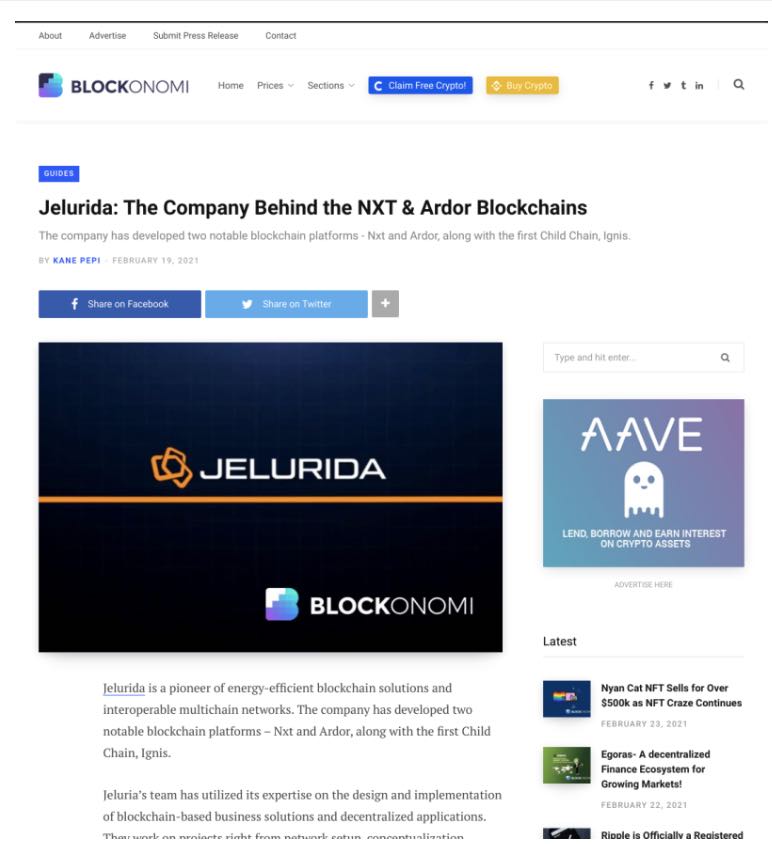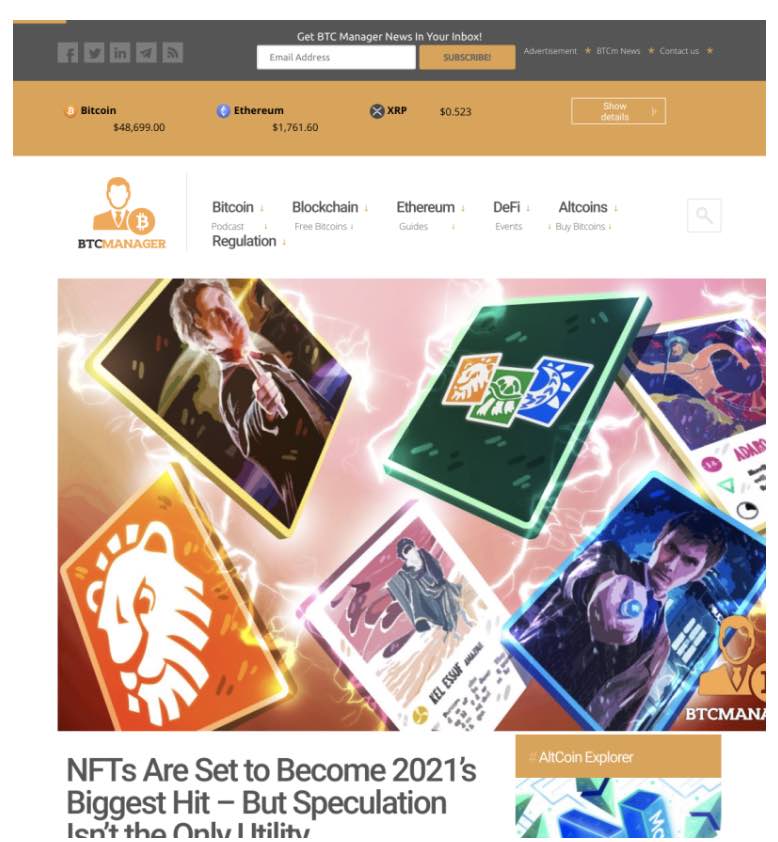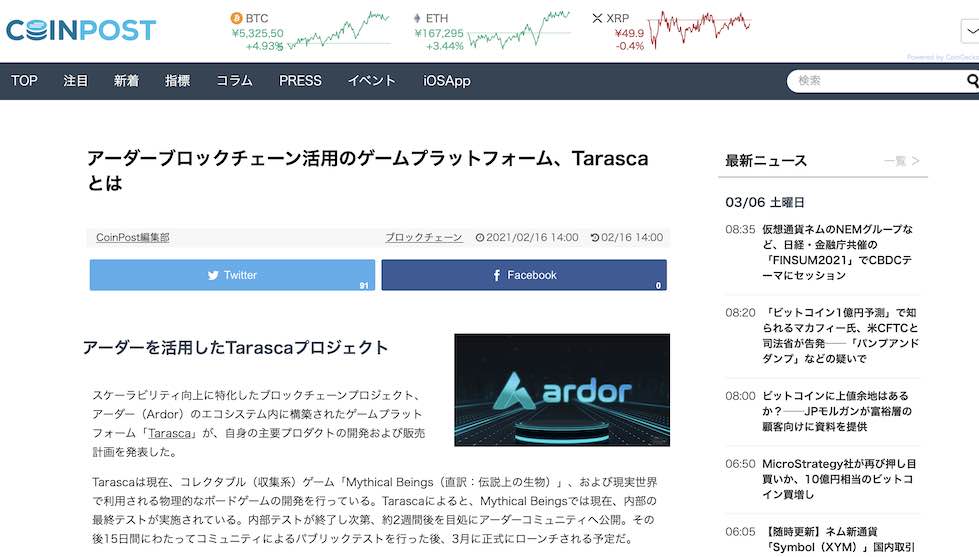Media Mentions
Jelurida Africaがナイジェリアの仮想通貨サービス禁止令にコメント
CoinPost: ジェルリダ・アフリカとは、アーダーブロックチェーン開発などで知られる、スイスのブロックチェーン開発企業ジェルリダのアフリカ支部だ。分散型台帳技術普及およびスマートコントラクトの専門家で構成され、アフリカでのブロックチェーン技術促進をミッションに、コンサルティング、教育およびプロダクト開発支援など、幅広い分野で活動している。
このような活動の一環として、ジェルリダ・アフリカは、アフリカ拠点の起業家や開発者の育成を目的としたABDC(Africa Blockchain Dev Call)プログラムを開催。3月には、「タンザニア・ブロックチェーン・ミートアップ 」と題した、教育目的のミートアップを主催する予定だ。
ジェルリダの共同創設者Lior Yaffe氏曰く、ジェルリダがアフリカに拠点を置き、アフリカ基盤のプロジェクトをサポートしているのは、同地域の金融サービスの少なさ、および透明性への需要増加が理由だという。このようなケースは、分散型台帳技術の最適なユースケースであると、同氏は述べている。
February 27, 2021


Nigeria – The people fight back against central bank cryptocurrency limitations
Bitcoinist.com: Around the African continent, the use of new digital currencies and fintech solutions is expanding, as a common interest in decentralized finance grows. One example is at Jelurida Africa, where a recent Africa Blockchain Developer Call Series program promoted more entrepreneurs and engineers getting involved in the cryptocurrency world. Jelurida Africa is an offshoot of a Swiss firm of the same name, which was incorporated in the Netherlands in 2016 and moved to Switzerland in 2017. Now, Jelurida Africa is engaged in prelaunch project testing and other goals ahead of additional expansion to a greater number of African nations. At the same time, Jelurida Africa Managing Director Adedayo Adebajo is addressing the Nigerian bank’s notice by noting the conflict between fiat and crypto systems. “My question is, will the CBN reinstate the cryptocurrency support if the fundraising is carried out in support of the sitting government?” Adebajo said, according to reporting at Bitcoin.com. “Situations like this provide more reasons why decentralization, as offered by the blockchain technology, is highly required in Africa.”
February 22, 2021
Nigerian Crypto Shut-Out Won’t Depress New Defi And Digital Asset Banking
BTC Manager: Now there are new fintech and cryptocurrency initiatives on the horizon that are generating their own interest and attention worldwide. For example, a firm called Jelurida Africa is trading on the success of its Africa Blockchain Developer Call Series and building a bigger footprint for eventual rollout in more African countries.
What is Jelurida Africa? According to its web site, the enterprise “offer(s) guides to startups and established businesses both ones that have adopted the technology and the prospects which can be in multiple stages” and “engage(s) in practical and training for staffs in the organization or institutions on the new technology, how it’s being used and the benefits it offers for their company processes.”
It’s part of a movement to make cryptocurrencies and decentralized finance assets more a part of the financial webwork, not less, and to allow different financial ecosystems to coexist better together. As Jelurida Africa Managing Director Adebayo Adebajo says of Nigeria’s CBN and its recent mandate
February 22, 2021


Jelurida: The Company Behind the NXT & Ardor Blockchains
Blockonomy: Jelurida is a pioneer of energy-efficient blockchain solutions and interoperable multichain networks. The company has developed two notable blockchain platforms – Nxt and Ardor, along with the first Child Chain, Ignis. Jeluria’s team has utilized its expertise on the design and implementation of blockchain-based business solutions and decentralized applications. They work on projects right from network setup, conceptualization, development, and maintenance. This article explores the ins and outs of Jelurida and what the platform offers.
Nxt is considered the first blockchain to be built entirely based on a proof-of-stake consensus protocol.
Ardor is a multichain blockchain platform is built on a unique parent-child chain architecture. The parent Ardor chain is responsible for safekeeping the entire network, whereas the interoperable child chain is loaded with rich functionalities.
February 19, 2021
NFTs Are Set to Become 2021’s Biggest Hit – But Speculation Isn’t the Only Utility
BTC Manager: Mythical Beasts of the World offers users the chance to purchase a starting deck of three digital NFT-based trading cards for just a few €. The project will issue a total of 50 individual cards, each one featuring the artwork of a mythical creature created by artist Ana Santiso, accompanied by a description of their cultural significance in their country of origin. There will be ten cards released per continent, with 30 available in the initial set and more released each month until there are 50 available in total. Cards will be issued in a limited number of copies and classified according to their scarcity as common, rare, or epic. Tarasca is using the Ardor blockchain to create the cards, so all users will hold their cards in an Ardor account and can trade their duplicates in the Ardor decentralized exchange. Although Tarasca doesn’t intend to create the kind of crazy speculation seen in other NFTs, the game developers believe that the cards will eventually be priced on the secondary market by supply and demand forces, with the epic cards naturally changing hands for higher prices.
February 16, 2021


アーダーブロックチェーン活用のゲームプラットフォーム、Tarascaとは
CoinPost: スケーラビリティ向上に特化したブロックチェーンプロジェクト、アーダー(Ardor)のエコシステム内に構築されたゲームプラットフォーム「Tarasca」が、自身の主要プロダクトの開発および販売計画を発表した。 Tarascaは現在、コレクタブル(収集系)ゲーム「Mythical Beings(直訳:伝説上の生物)」、および現実世界で利用される物理的なボードゲームの開発を行っている。Tarascaによると、Mythical Beingsでは現在、内部の最終テストが実施されている。内部テストが終了し次第、約2週間後を目処にアーダーコミュニティへ公開。その後15日間にわたってコミュニティによるパブリックテストを行った後、3月に正式にローンチされる予定だ。 ボードゲームに関しては、3月末または4月にクラウドファンディングで販売が予定されている。ボードゲーム購入者には、プロジェクトをサポートしてくれる謝礼として、Mythical Beingsのデジタルカード1パックが贈与される。購入者は、希少性の高いレアカードも選択可能だという。
February 16, 2021